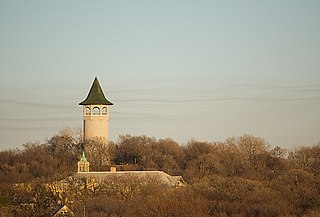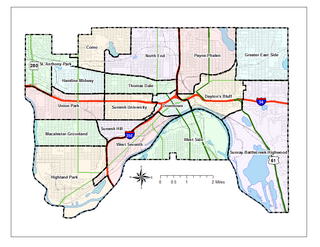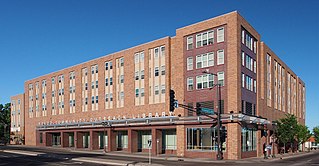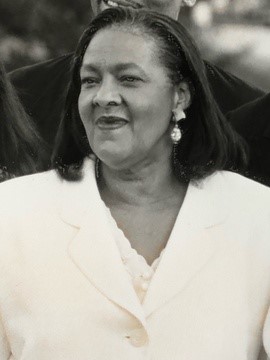Related Research Articles

Saint Paul is the capital of the U.S. state of Minnesota and the county seat of Ramsey County. Situated on high bluffs overlooking a bend in the Mississippi River, Saint Paul is a regional business hub and the center of Minnesota's government. The Minnesota State Capitol and the state government offices all sit on a hill close to the city's downtown district. One of the oldest cities in Minnesota, Saint Paul has several historic neighborhoods and landmarks, such as the Summit Avenue Neighborhood, the James J. Hill House, and the Cathedral of Saint Paul. Like the adjacent city of Minneapolis, Saint Paul is known for its cold, snowy winters and humid summers.

Prospect Park is a historic neighborhood within the University community of the U.S. city of Minneapolis, Minnesota. The area is bounded by the Mississippi River to the south, the City of Saint Paul, Minnesota to the east, the Burlington Northern railroad yard to the north, and the Stadium Village commercial district of the University of Minnesota to the west. The neighborhood is composed of several districts which include the East River Road area. The 1913 Prospect Park Water Tower is a landmark and neighborhood icon.

Sharon Sayles Belton is an American community leader, politician and activist. She is Vice President of Community Relations and Government Affairs for Thomson Reuters Legal business.
Rondo Days is an annual festival held the 3rd Saturday in July in Saint Paul, Minnesota, that commemorates the Rondo neighborhood, an African-American community that was split in two by the construction of Interstate 94 in the mid-1960s. The festival has grown since its inception in 1983, by co-founders Floyd G. Smaller and Marvin R. Anderson, to become the largest African American sponsored festival in Minnesota.

Minneapolis, officially the City of Minneapolis, is a city in the state of Minnesota and the county seat of Hennepin County. With a population of 429,954, it is the state's most populous city as of the 2020 census. It occupies both banks of the Mississippi River and adjoins Saint Paul, the state capital of Minnesota. Minneapolis, Saint Paul, and the surrounding area are collectively known as the Twin Cities, a metropolitan area with 3.69 million residents. Minneapolis is built on an artesian aquifer on flat terrain, and is known for cold, snowy winters and hot, humid summers. Nicknamed the "City of Lakes", Minneapolis is abundant in water, with thirteen lakes, wetlands, the Mississippi River, creeks, and waterfalls. The city's public park system is connected by the Grand Rounds National Scenic Byway.

Interstate 94 (I-94) in the US state of Minnesota runs 259 miles (417 km) east–west through the central portion of the state. The highway connects the cities of Moorhead, Fergus Falls, Alexandria, St. Cloud, Minneapolis, and Saint Paul. Authorized in 1956, it was mostly constructed in the 1960s. For its whole length, it runs concurrently with either US Highway 52 (US 52) or US 12.

Saint Paul, Minnesota, consists of 17 officially defined city districts or neighborhoods.

The S. Edward Hall House in Saint Paul, Minnesota, United States, was the home of S. Edward Hall (1878-1975), an African American businessman and founder of the Saint Paul chapter of the NAACP. It was listed on the National Register of Historic Places from 1991 to 2016.

Frogtown is a neighborhood in Saint Paul in the U.S. state of Minnesota. Built around University Avenue, the Thomas-Dale neighborhood is colloquially known as Frogtown. Historically, Frogtown was a subsection of the current Thomas-Dale neighborhood. It is bordered by University Avenue on the south, the Burlington Northern Railroad tracks to the north, Lexington Parkway on the west and Rice Street on the east.

The Penumbra Theatre Company, an African-American theatre company in Saint Paul, Minnesota, was founded by Lou Bellamy in 1976. The theater has been recognized for its artistic quality and its role in launching the careers of playwrights including two-time Pulitzer Prize-winner August Wilson.
Springboard for the Arts is a not-for-profit arts service organization based in Saint Paul, Minnesota. Springboard for the Arts provides arts-related resources to independent artists and arts organizations including professional development education and workshops, fiscal sponsorship, micro-lending, health care resources, and career consultations.

Summit-University is a neighborhood in Saint Paul, Minnesota, United States, that stretches roughly from University Avenue in the north, Lexington Parkway to the west, Summit Avenue to the south and to the east along John Ireland Boulevard, Kellogg Boulevard and Marion Street. Summit-University, Selby-Dale, St. Anthony Hill, Cathedral Hill, Woodland Park, Crocus Hill, Ramsey Hill, Hill District, Historic Hill District, Uni-Dale, North Quadrant, and Central Village all refer to parts of the neighborhood that is broadly known as Summit-University.

Selby Avenue is a street in Saint Paul, Minnesota, United States, that runs east–west from Summit Avenue near downtown toward the Mississippi River. The street runs through the Summit-University and Union Park neighborhoods. The street, especially between Dale Street and Snelling Avenue, has been associated with Saint Paul's black community. The far eastern end of the street has historically been more densely developed and architecturally significant.

The Unidale Mall is a shopping mall located at the intersection of University Avenue and Dale Street in Saint Paul, Minnesota, United States. The mall is in the Summit-University neighborhood just across from the Frogtown neighborhood. The Rondo Community Outreach Library is west across Dale Street. The Dale Street station on the Green Line is also at the intersection.
Lou Bellamy is an American stage director, actor, producer, entrepreneur, and educator. He is the founder and artistic director, Emeritus of Penumbra Theatre Company in St. Paul, Minnesota. He taught at the University of Minnesota from 1979 until his retirement as an associate professor in 2011.

Melvin Whitfield Carter III is an American politician who is the mayor of Saint Paul, Minnesota. Elected to his first term in 2017 and reelected in 2021, Carter is the 55th mayor of St. Paul and its first African American mayor. His current term of office ends on January 1, 2026. Carter has supported raising the city's minimum wage to $15 per hour. He is one of 11 U.S. mayors who co-founded Mayors Organized for Reparations and Equity, a coalition of municipal leaders dedicated to starting pilot reparations programs in their cities.

The Rondo neighborhood, or simply Rondo, is located within the officially designated Summit-University district in Saint Paul, Minnesota. The boundaries of the historically black neighborhood are sometimes referred to as Old Rondo. For much of the 20th century, Rondo was an important cultural and residential center of the black community in the Minneapolis–Saint Paul metropolitan region. The core of Old Rondo was demolished between 1956 and 1968, to make way for the construction of the Interstate 94 freeway. At least 650 families were displaced from the neighborhood, as well as many businesses and community locations. The neighborhood, although scarred by highway construction, remained a notable area in Saint Paul with a strong sense of cultural identity. Popular media and historians have the explored the impacts of highway construction and gentrification on Rondo residents past and present. In the 2000s, residents and public officials have discussed ways to reconnect the former community.

Clarissa Rogers Walker was an American social activist and community leader based in Minneapolis, Minnesota. She was known for her social contributions in the South Minneapolis area for the African-American community. She served for more than three decades as the director of Sabathani Community Center, a multi-ethnicity community service center in Minneapolis, Minnesota. In November 2019, the City Council of Minneapolis announced a commemorative honor to Walker along with activist Launa Newman by renaming and dedicating specific portions of avenues amongst the 38th Street corridor to their names respectively as a tribute to their contributions.
Denzil Angus Carty was an Episcopal priest and civil rights leader. Carty advocated for fair housing and against discrimination and worked primarily in St. Paul, Minnesota.

Katie McWatt was a civil rights leader and activist who worked primarily in St. Paul, Minnesota. She was the first African American person to run for the St. Paul City Council.
References
- 1 2 Hammond, Ruth (June 2, 1979). "An institution called Hallie Q. Brown - it nurtures a whole neighborhood". Star Tribune .
- 1 2 3 Johnson, Tiffany (November 27, 2019). "Hallie Q. Brown Community Center celebrates 90 years of Service". Minnesota Spokesman-Recorder . Archived from the original on November 29, 2019. Retrieved August 6, 2022.
- ↑ Cohen, Ben (February 25, 2001). "Black History Month - a place to stay". Star Tribune . p. B1.
- ↑ "Hallie Q. Brown". Star Tribune . November 3, 1979. Archived from the original on August 7, 2022. Retrieved August 7, 2022.
- ↑ Hammond, Ruth (June 2, 1979). "Memories of a Place of Love". Star Tribune .
- 1 2 Peterson, David (June 11, 1990). "African Americans in Minnesota - Issues of Race. There were African American millionaires in Minnesota in the nineteenth century. There was also a black literary society. For more than a century, Minnesota has had one of the nation's best-educated and most vigorous black communities". Star Tribune . p. 10e.
- ↑ "Our Perspective: Building community - Black self-help began a century ago". Star Tribune . October 29, 1995.
- ↑ "The Hallie Q. Brown Center, (St. Paul) Opens". African American Registry. Retrieved August 6, 2022.
- ↑ ""Points of Entry: The African American Heritage Guide to Saint Paul." – Hallie Q. Brown Community Center". CultureBrokers Foundation, Inc. Saint Paul Historical. 2008. Retrieved August 6, 2022.
- ↑ "Saint Paul African American Historic and Cultural Context". Saint Paul Heritage Preservation Commission. November 4, 2021. Retrieved August 6, 2022.
- 1 2 3 Gray, Brenda Lyle (December 4, 2020). "The Lighthouse of the Community: Hallie Q. Brown Community Center". Insight News. Retrieved August 6, 2022.
- ↑ Kelly, Suzanne (November 2, 1989). "Hallie Brown Center to mark 60 years in community at dinner". Star Tribune .
- ↑ Snowbeck, Christopher; Carlson, Joe (April 20, 2021). "Minnesota deploys modified buses for mobile vaccination clinics - Buses deployed to reach out to communities hit hard by COVID-19" . Star Tribune . Archived from the original on April 21, 2021. Retrieved August 14, 2022.
- 1 2 "December Positive Change: Hallie Q. Brown Community Center". Mississippi Market Co-op. Retrieved August 8, 2022.
- ↑ Xiong, Chao (July 29, 2017). "109-year-old Dorothy Hall McFarland was dedicated to music, children, community" . Star Tribune . Archived from the original on July 30, 2017. Retrieved August 7, 2022.
- ↑ Eler, Alicia (June 13, 2019). "With a theme of 'resilience,' Northern Spark flies into Rondo and Franklin Av. neighborhoods Rondo and Franklin Av. share the focus of a fest devoted to renewal" . Star Tribune . Archived from the original on June 13, 2019. Retrieved August 7, 2022.
- ↑ G. Hill, Errol; V. Hatch, James (2003). A History of African American Theatre. Cambridge: Cambridge University Press. pp. 412–13. 471–72.
- ↑ Mahala, Macelle (2013). Penumbra: The Premiere Stage for African American Drama. Minneapolis: University of Minnesota Press. p. 9.
- ↑ "Board of Directors Meeting Minutes". Penumbra Theatre Company Archives.
- ↑ Vaughan, Peter (January 18, 1991). "Bye resigns as Penumbra's managing director". StarTribune . Minneapolis. p. 5E.
- 1 2 Smith, Kelly (May 29, 2021). "Minnesota nonprofits hit hard by COVID-19 begin long road to recovery-Groups lobbying for $50M "resiliency fund" to bolster those still struggling" . Star Tribune . Archived from the original on July 26, 2021. Retrieved August 6, 2022.
- 1 2 3 Theisen, Amanda (March 19, 2021). "Blue Cross to help Hallie Q. Brown Community Center archive Rondo neighborhood history". BlueCrossBlueShield Minnesota. Retrieved August 6, 2022.